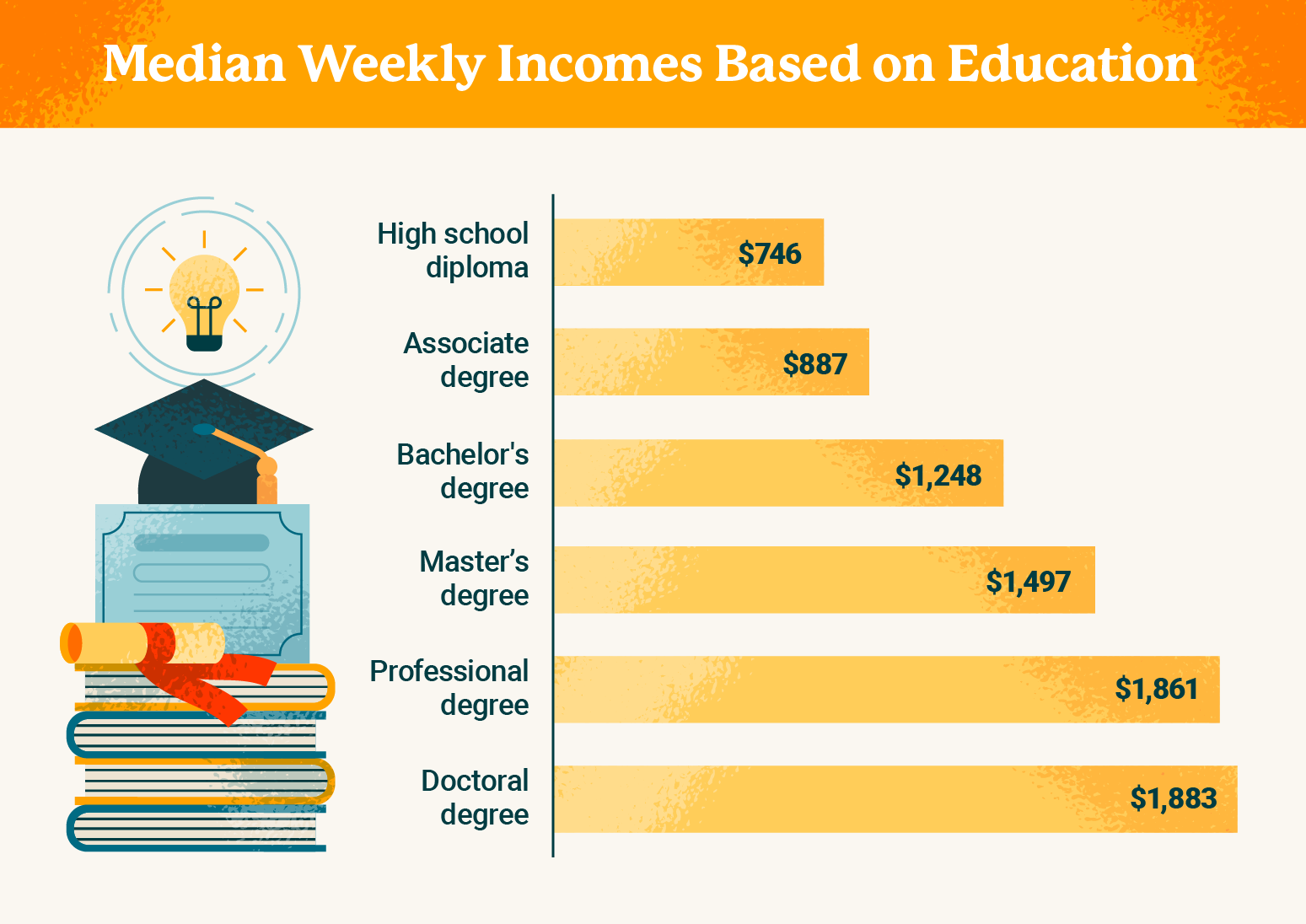
The average American spends 90,000 hours at work in their lifetime. ((Susan Peppercorn, “Why You Should Stop Trying to Be Happy at Work,” Harvard Business Review, July 26, 2019: https://hbr.org/2019/07/why-you-should-stop-trying-to-be-happy-at-work)) That staggering figure illustrates why it’s so important to find a career with passion and purpose and to develop a career plan. While stagnancy in the workplace can bring frustration and boredom, setting your sights on a leadership position will motivate you to find new areas of fulfillment and advance your career. With hard work, dedication, and time, reaching your career goals in the healthcare field—such as roles in healthcare administration or advanced nursing, is achievable.
This post explains the why and how of career advancement, with a special focus on strategies for healthcare professionals. You can jump ahead to the visual, “How to Prove You’re Worthy of Career Advancement,” for additional tips and insight.
Career Advancement: What It Is and Why It Matters
Definition: Career advancement is the upward trajectory of a person’s professional journey. Examples include progressing from an entry-level position to management and transitioning from one occupation to another. ((Dawn Rosenberg McKay, “Career Advancement: How to Move Up at Work,” The Balance Careers, Sept. 18, 2018: https://www.thebalancecareers.com/advancement-525653))
One’s career growth can also signify one’s professional development. Many working adults strive to advance their careers through gaining new skills and knowledge that they can apply on the job. One person’s goal may be to become CEO of their company, while another person may regard earning their Doctor of Nursing Practice (DNP) degree as the ultimate indicator of successful career advancement.
Each person’s career path may be different, but the potential for career advancement is a valuable tool in motivating and retaining staff.3 Opportunities to advance may manifest in a variety of ways, from a job promotion to specialty training for a specific position to a single assignment with increased responsibility.potential for career advancement is a valuable tool in motivating and retaining staff. ((“Workers are looking–and leaving–for career development,” Human Resources Today: https://www.humanresourcestoday.com/career-development/retention-and-turnover/?open-article-id=10671518&article-title=workers-are-looking—and-leaving—for-career-development&blog-domain=hrmorning.com&blog-title=hr-morning)) Opportunities to advance may manifest in a variety of ways, from a job promotion to specialty training for a specific position to a single assignment with increased responsibility.
Benefits of Career Advancement


There are multiple benefits to advancing your career. Most obviously, you can expect to earn more money over time as you progress. As the chart above shows, investing time and money in education has a direct impact on the average American’s salary. ((“Learn more, earn more: Education leads to higher wages, lower unemployment,” Career Outlook, U.S. Bureau of Labor Statistics, May 2020: https://www.bls.gov/careeroutlook/2020/data-on-display/education-pays.htm)) Improved take-home pay may also translate to an improved quality of life. A 2017 study revealed that when people paid for time-saving services, like ordering takeout or hiring a housecleaner, they were more satisfied than when they purchased material items. ((Ashley V. Whillans et al., “Buying time promotes happiness,” PNAS, Aug 8, 2017: https://www.pnas.org/content/114/32/8523.full#ref-3))
The positive impact of career advancement goes beyond money. New opportunities can develop on an upward career trajectory and bring about the excitement of taking on positive new challenges. Potential examples include:
- The chance to travel to speaking engagements
- Becoming a published author
- Participating in cutting-edge research
- Refining skills and expertise
Some may take a chance at career growth out of a desire to explore new professional interests or to avoid ongoing boredom and mediocrity in their current job.
12 Tips to Level Up Your Career
Creating a plan or strategy for advancing your career requires focus, energy, and time. Follow these steps to climb the career ladder. ((Susan M. Heathfield, “5 Tips to Improve Your Career Development,” The Balance Careers, Feb. 20, 2021: https://www.thebalancecareers.com/improving-career-development-4058289)) ((We Mean Career, “33 Tips to Advance Your Career”: https://wemeancareer.com/tips-to-advance-your-career)) ((REED, “8 Mid-level Career Progression Tips”: https://www.reedglobal.com/blog/2017/07/mid-level-career-progression-advice)) ((Michael Rochow, “8 Career Advancement Tips From 8 Wildly Successful People,” Noomi Career Blog, 2018: https://career.noomii.com/8-ways-rapidly-advance-career/))
1. Define your career goals.
Given that 70% of employees are not reaching their full potential at work each day, it’s good to closely examine what you hope to achieve in your career so you can perform at your best. ((Marcel Schwantes, “Research: Why 70 Percent of Employees Aren’t Working to Their Full Potential Comes Down to 1 Simple Reason,” Inc., Nov. 22, 2017: https://www.inc.com/marcel-schwantes/research-why-70-percent-of-employees-arent-working-to-their-full-potential-comes-down-to-1-simple-reason.html)) Finding clarity about what inspires you in your work life will help you create a personal roadmap to workplace success—or offer an escape route if you find yourself in an unfulfilling job.
Once you have identified your career advancement goals, be sure to share them with others, especially with those who may have an impact on your planned journey. You can begin thinking about this step as a way to develop a solid, honest response to the classic interview question, “Where do you see yourself in five years?” What you determine here will influence every step of your journey to come.
With so many specialty areas in the field of healthcare, professionals should take stock of which focus fits them when setting their long-term career goals.
2. Understand your options.
Take time to learn about the advancement options within your company or industry. You can discover details of potential opportunities through HR, colleague referrals, or digital research. Ideally, conversations about potential career growth will begin during the job interview process. At every step, pay attention to the workload and opportunities presented to those who have held your dream position to identify the advancement strategy that fits your goals.
Advancement does not always require moving up to get ahead. Lateral moves within your company or industry can offer opportunities to do something new—especially for those working in a position that has no direct paths for advancement available.
Healthcare career opportunities are expanding, thanks to new technology ((Maggie Kimberl, “Healthcare Jobs 2.0: The Future of Healthcare and Tech,” Association for Talent Development, Jan. 31, 2019: https://www.td.org/insights/healthcare-jobs-20-the-future-of-healthcare-and-tech)) and ongoing workforce challenges, such as the current nursing shortage, in the field. Connect with HR leaders, industry organizations, medical news apps and colleagues to stay updated on potential career paths.
3. Examine the bigger picture.
Step back from the daily grind to look at the big-picture outcome you strive in your career. Having that vision in mind will help you take advantage of opportunities that align with your career goals.
Maintain a balance between the critical details of your work and the broader goals you have for your career in healthcare. Strategic decisions you make along your career should be strongly influenced by your long-term goals.


4. Level up your learning.
Improving your educational foundation can really boost your career. 72% of Americans believe that “a lot” of responsibility falls on individuals to make sure they have the right skills and education to be successful. ((“The State of American Jobs,” Pew Research Center, Oct. 6, 2016: https://www.pewresearch.org/social-trends/2016/10/06/the-state-of-american-jobs/)) Show your employer that you’re willing to invest in gaining new knowledge and skills to benefit your career and the company.
Committing the time and energy to earn a graduate degree can directly impacts salary expectations. Exploring on-the-job training, online certifications, and continuing education classes can also benefit your journey.
Some companies may cover the cost of new training, and some may assist with tuition fees. Speak with your HR representative to learn more about the policies at your workplace.
A wide array of educational opportunities exists for healthcare professionals. Growing your skills and knowledge through advanced nursing degrees, post-professional physical therapy and occupational therapy programs, and doctoral healthcare education tracks can open up doors to new levels of your career.
5. Reveal your character and confidence every day.
Think of your career advancement journey as one extremely long job interview, where you want to put your best foot forward every day to impress decision-makers. Self-confidence is a critical component of getting others to believe in you and value what you have to offer. Consider every workplace interaction as an opportunity to demonstrate your honesty and integrity, which are qualities desired by most leaders.
Consider your outward appearance by dressing for success each day. Showing yourself as a person who is consistently reliable and put together can go a long way in encouraging others to take you seriously.
Engaging with patients and colleagues in a professional and confident manner is a must for success in the healthcare industry. Be mindful that healthcare professionals are tasked with protecting patient confidentiality, a responsibility that requires integrity and vigilance.
6. Make yourself useful to colleagues.
Volunteering to assist other teams or departments within your company can benefit you on multiple levels. It shows you are a team player who is willing to jump in when needed.
Engaging in projects with other parts of the organization also enables you to see firsthand how other departments function. Such experiences can help you make more informed decisions along your career trajectory. A study by the O.C. Tanner Institute revealed that when employees feel connected to their team, they report a 131% increase in feeling like they continuously learn new and valuable things. ((“Leadership: traditional vs. modern,” Global Culture Report, O.C. Tanner Institute, 2020: https://www.octanner.com/global-culture-report/2020/leadership.html))
A willingness to offer help or support to colleagues can go a long way in a busy healthcare work environment. Remembering to share credit when appropriate and being accountable when mistakes occur will show staff and leadership that you are responsible and trustworthy.
7. Explore mentorships.
Build a mentoring relationship with an individual who has achieved the level of results you are seeking. Their success and experiences can inform your actions and decisions along the way, with the goal of minimizing workplace mistakes and helping to move your career along. Research shows that mandatory mentorship programs can produce valuable gains—for employees and their companies. ((“Why Your Mentoring Program Should Be Mandatory,” Harvard Business Review, September 2022, https://hbr.org/2022/09/why-your-mentoring-program-should-be-mandatory.))
Be selective when determining a mentor. Just because they hold (or held) the position you seek does not mean they did it well. Seek out someone you both respect and can connect with to make such a relationship work.
Don’t be afraid to ask for help and guidance from one or more professionals you trust. Stay open to the idea of working with two or more mentors, representing different aspects of your field and area of expertise. Having one mentor from administration and another who has a clinical degree, such as a Master of Science in Nursing (MSN) with a Family Nurse Practitioner role specialty, will give you a mix of perspectives that can support your growth.


8. Challenge yourself by requesting new responsibilities.
Meet with your manager to request more challenging projects and tasks. Share your plan for career advancement with them so they are clear on your goals. Research shows that when an employee participates in a special project and excels, they are 78% more likely to believe that their job is preparing them for their future career. ((“Employee & Business Success,” Global Culture Report, O.C. Tanner Institute, 2019: https://www.octanner.com/global-culture-report/2019/success.html))
Taking on new responsibilities shows your hard work and ability to manage the new challenge and the workload. Proving your dedication and work ethic to your direct manager might inspire them to become a champion for you on your journey.
Seek out respectful engagement with your manager to communicate your desire for new challenges—and use these opportunities to grow your leadership skills. Of course, be sure to stay on top of your regular duties if you take on extra projects.
9. Learn about the power of sponsorship.
Within the world of work, a sponsor is a person in a senior leadership role who becomes your champion and advocates for you in the workplace. Your sponsor will help you build relationships with powerful people within the company, recommend you for projects, and have your back when you take on riskier ventures. 2019 statistics indicate that those with a sponsor are paid 11.6% more than those who do not. ((Teresa Perez, “Sponsors: Valuable Allies Not Everyone Has,” PayScale, July 31, 2019: https://www.payscale.com/data/mentorship-sponsorship-benefits))
Sponsorships require developing a strategic workplace partnership between a person with power and a person searching it. They can also provide opportunities for those who typically don’t have equal access to leadership opportunities, such as women and people of color. ((Herminia Ibarra, “A Lack of Sponsorship Is Keeping Women from Advancing into Leadership,” Harvard Business Review, Aug. 19, 2019: https://hbr.org/2019/08/a-lack-of-sponsorship-is-keeping-women-from-advancing-into-leadership))
Leadership roles in healthcare often require administrative skills that staff on their way up the ladder haven’t developed yet. Take the time to find a manager or executive in your organization who is willing to assist and support you through sponsorship.
10. Stay aware of internal opportunities.
It’s up to you to stay abreast of internal job listings that align with your skills and interests. Internal hiring is six times more effective than all other sources of hiring. ((“2017 Recruiting Funnel Benchmark Report,” Jobvite, 2017: https://www.jobvite.com/wp-content/uploads/2017/05/Jobvite_2017_Recruiting_Funnel_Benchmark_Report.pdf))
Make time with weekly calendar reminders to review internal opportunities that will move you either toward a higher position or laterally to a position with greater advancement possibilities down the line.
Monitor your organization’s staffing shifts and personnel movements to locate potential internal jobs. Stay in touch with your HR representative to let them know you are open to new opportunities.
11. Volunteer with industry organizations.
Showing a commitment to your broader field of work provides an opportunity for you to network and build a positive reputation in your business community. It also indicates to colleagues that you have a big-picture mindset about your professional life by demonstrating your passion and respect for the field through your willingness to focus on it outside of office hours. Lastly, some of the people you’ll meet in these organizations would have status within the industry, some of which can pave the way for growth opportunities.
Get active in healthcare associations to broaden your scope and knowledge. There are a wide variety to serve your needs, whether you are a nurse, healthcare administrator, or another type of health professional.
12. Strengthen your networking skills.
LinkedIn reports that 80% of professionals consider professional networking to be important to career success. ((“Eighty-percent of professionals consider networking important to career success,” LinkedIn, June 22, 2017: https://news.linkedin.com/2017/6/eighty-percent-of-professionals-consider-networking-important-to-career-success)) Knowing how to market yourself is a valuable skill at every stage of your career. Attending a mix of in-person and online networking events will help new colleagues and business leaders recognize you and give you a chance to demonstrate your work ethic, knowledge, and skills.
Build connections with other healthcare professionals, both inside and outside of your specialty. Colleagues and associates tend to be great resources when it comes to discovering the latest job or research openings.
Initiative is the name of the game when it comes to career advancement. 62% of employees in managerial positions report higher job satisfaction. ((“The State of American Jobs,” Pew Research Center, Oct. 6, 2016: https://www.pewresearch.org/social-trends/2016/10/06/3-how-americans-view-their-jobs/)) You can be part of that number through planning, reflection, and hard work.
#:

Infographic Source:
“Learn more, earn more: Education leads to higher wages, lower unemployment,” Career Outlook, U.S. Bureau of Labor Statistics, May 2020: https://www.bls.gov/careeroutlook/2020/data-on-display/education-pays.htm








